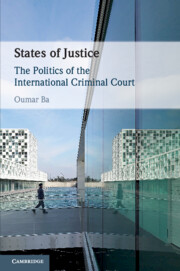Refine search
Actions for selected content:
11 results
1 - Escaping Justice in the Age of Accountability
-
- Book:
- Escaping Justice
- Published online:
- 19 September 2025
- Print publication:
- 09 October 2025, pp 22-52
-
- Chapter
-
- You have access
- Open access
- HTML
- Export citation
4 - Justice Concessions in Northern Ireland
-
- Book:
- Escaping Justice
- Published online:
- 19 September 2025
- Print publication:
- 09 October 2025, pp 127-169
-
- Chapter
-
- You have access
- Open access
- HTML
- Export citation
3 - The Big Tent of Justice in Uganda
-
- Book:
- Escaping Justice
- Published online:
- 19 September 2025
- Print publication:
- 09 October 2025, pp 89-126
-
- Chapter
-
- You have access
- Open access
- HTML
- Export citation
Introduction
-
- Book:
- Escaping Justice
- Published online:
- 19 September 2025
- Print publication:
- 09 October 2025, pp 1-21
-
- Chapter
-
- You have access
- Open access
- HTML
- Export citation
Conclusion
-
- Book:
- Escaping Justice
- Published online:
- 19 September 2025
- Print publication:
- 09 October 2025, pp 170-181
-
- Chapter
-
- You have access
- Open access
- HTML
- Export citation

Escaping Justice
- Impunity for State Crimes in the Age of Accountability
-
- Published online:
- 19 September 2025
- Print publication:
- 09 October 2025
-
- Book
-
- You have access
- Open access
- Export citation
7 - International Justice in a World of States
-
- Book:
- States of Justice
- Published online:
- 02 June 2020
- Print publication:
- 02 July 2020, pp 138-162
-
- Chapter
- Export citation
Chapter Seven - The Anti-Impunity Transnational Legal Order for Human Rights
- from Part III - Transnational Legal Ordering and International Crimes
-
-
- Book:
- Transnational Legal Ordering of Criminal Justice
- Published online:
- 05 June 2020
- Print publication:
- 02 July 2020, pp 205-233
-
- Chapter
- Export citation
2 - States of Justice
-
- Book:
- States of Justice
- Published online:
- 02 June 2020
- Print publication:
- 02 July 2020, pp 25-39
-
- Chapter
- Export citation

States of Justice
- The Politics of the International Criminal Court
-
- Published online:
- 02 June 2020
- Print publication:
- 02 July 2020
2 - International Pressure for Corporate Accountability
- from Part I - Obstacles to Corporate Accountability
-
- Book:
- Transitional Justice and Corporate Accountability from Below
- Published online:
- 10 April 2020
- Print publication:
- 30 April 2020, pp 61-112
-
- Chapter
- Export citation
